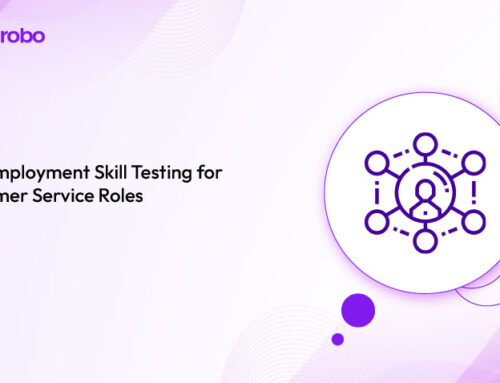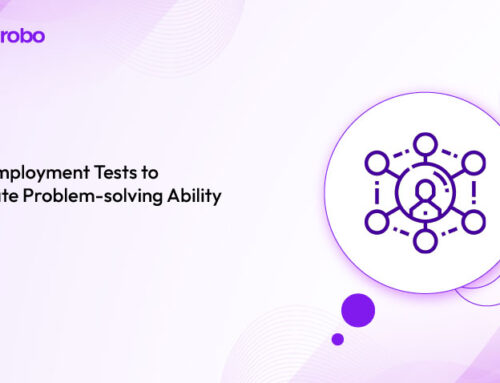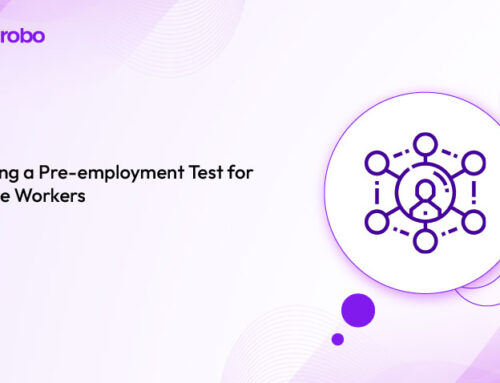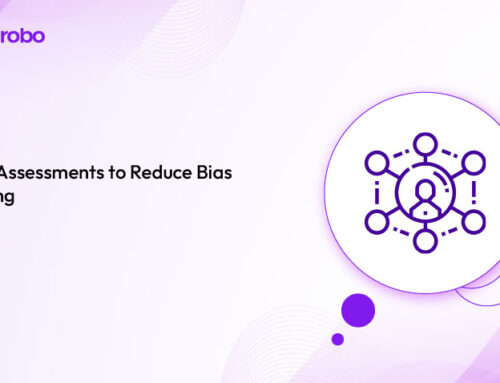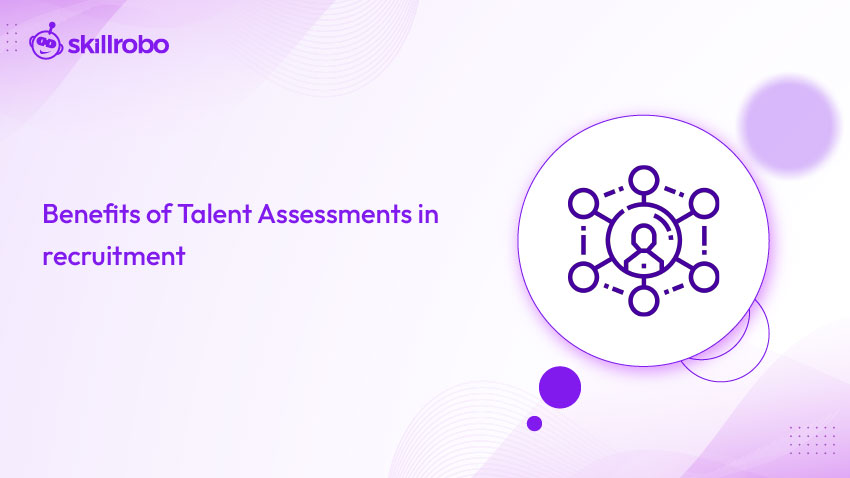
Key Takeaways
- Talent assessments improve hiring accuracy by objectively evaluating a candidate’s skills, competencies, and cultural fit.
- Using pre-employment assessments helps reduce unconscious bias and enhances the diversity of new hires.
- Companies that integrate candidate assessments into hiring can reduce the time to hire by up to 50%, improving overall recruitment efficiency.
- Talent assessments provide predictive insights into candidate success, leading to higher employee performance and lower turnover rates.
A New Era in Hiring: The Role of Talent Assessments
Hiring the right talent has always been a priority for growing organizations. Yet, identifying the best candidate is increasingly complex as job roles evolve and competition tightens. Talent assessments have emerged as a crucial strategy to evaluate candidates more accurately, helping businesses make informed, data-driven hiring decisions.
In this blog, we’ll explore the key benefits of talent assessments in recruitment and how they can transform your hiring process.
Why Talent Assessments are Critical for Modern Recruitment
Talent assessments offer a structured, objective way to measure a candidate’s skills, behaviors, and cultural fit before hiring. This approach addresses common challenges like unconscious bias and reliance on subjective judgment.
According to a survey by the Society for Human Resource Management (SHRM), structured assessments lead to more consistent hiring outcomes and better job performance. Companies such as Deloitte have integrated assessment tools early in their recruitment process to improve the quality of hires and strengthen employer branding.
Beyond technical skills, assessments can gauge critical competencies like leadership potential, cognitive abilities, and adaptability—qualities increasingly sought after in dynamic workplaces.
By integrating assessments into recruitment workflows, HR teams can better predict candidate success, saving time and resources while building stronger teams.
How Talent Assessments Improve Hiring Accuracy
The traditional resume review process often misses key indicators of future performance. Talent assessments fill this gap by providing objective, measurable insights into candidates’ skills and behaviors.
For example, U.S.-based companies like Amazon have adopted structured assessments to enhance the objectivity of their hiring decisions. Skills-based tests, cognitive evaluations, and behavioral interviews help eliminate guesswork and ensure candidates meet role-specific requirements.
Additionally, assessments help detect soft skills that are harder to gauge through interviews alone, such as problem-solving, teamwork, and leadership potential. Incorporating these tools reduces the risk of mis-hires and improves long-term employee retention.
For recruiters aiming to improve accuracy, integrating assessment tools early in the selection process is crucial to achieving better hiring outcomes.
Benefits of Talent Assessments in Enhancing Recruitment and Workforce Management
Talent assessments have become an essential tool for modern recruitment strategies. From improving hiring efficiency to fostering diversity and predicting employee success, assessments offer measurable advantages at every stage. Here are some of the key benefits of using talent assessments to strengthen hiring decisions and workforce planning.
1. Enhancing Recruitment Efficiency Through Talent Assessments
Speed is essential in competitive hiring markets. Talent assessments allow recruiters to quickly filter out unqualified candidates, ensuring only the most suitable move forward.
According to LinkedIn’s 2024 Global Talent Trends report, companies using assessments experience a 36% faster time-to-hire compared to those relying solely on resumes and interviews. Automated assessments streamline early-stage screening, saving valuable time for both candidates and hiring teams.
Organizations like General Electric have successfully used digital assessments to accelerate their graduate recruitment programs, resulting in faster and more equitable hiring processes. By shortening the recruitment cycle, assessments not only save costs but also improve the candidate experience, reinforcing the employer brand.
2. Building a Diverse and Inclusive Workforce with Talent Assessments
Bias, whether conscious or unconscious, can significantly impact hiring decisions. Talent assessments introduce standardization, helping to create fair and equitable evaluation processes.
Research by McKinsey & Company shows that diverse organizations outperform their peers by 36% in profitability. Standardized assessments remove subjective bias by focusing on measurable criteria, ensuring all candidates are evaluated based on skills and potential.
Companies like Google use structured assessments and skills-based hiring to foster a more inclusive workplace. Implementing fair assessments supports diversity initiatives and aligns hiring practices with broader organizational values. Recruiters committed to building inclusive teams must integrate objective assessment tools into their recruitment strategy.
3. Providing Predictive Insights for Better Talent Management
Effective hiring goes beyond filling open roles—it’s about predicting candidate success and potential within the organization. Talent assessments provide predictive data that helps align hiring with long-term business goals.
Assessment tools can forecast an employee’s likelihood of success in a role by evaluating competencies that correlate with high performance. For example, leadership potential assessments can help identify future managers early in their careers.
Companies such as IBM leverage predictive hiring analytics to align talent acquisition with workforce planning. This approach enhances succession planning and drives better business outcomes. Investing in talent assessments sets the foundation for smarter workforce management and future-proofing your organization.
4. Reducing Hiring Costs with Talent Assessments
Making the wrong hire can be costly for organizations. Talent assessments minimize this risk by ensuring only qualified candidates progress through the hiring pipeline. According to the U.S. Department of Labor, a bad hire can cost up to 30% of the employee’s first-year earnings. Structured assessments help avoid costly recruitment mistakes by providing objective data on candidates’ skills and suitability.
Companies like Southwest Airlines use assessments to screen candidates efficiently, reducing turnover and saving significant recruitment and training expenses. By identifying the right talent early, organizations can optimize hiring budgets and achieve better ROI on recruitment investments.
5. Improving Employee Retention Through Better Hiring Decisions
Employees who are well-matched to their roles tend to stay longer and perform better. Talent assessments ensure that candidates align with both the job requirements and company culture.
Research by the Brandon Hall Group found that organizations using pre-hire assessments experience 39% lower turnover among new hires. These tools measure not only technical abilities but also behavioral traits, ensuring stronger job fit.
Companies like Zappos prioritize cultural fit assessments to maintain high retention rates and team cohesion. Using talent assessments strategically strengthens workforce stability and reduces the ongoing costs associated with employee turnover.
How Skillrobo Helps Simplify Talent Assessment
Skillrobo offers a powerful, AI-powered pre-employment assessment solution designed to streamline candidate evaluation. The platform provides role-specific assessments covering cognitive, behavioral, and leadership competencies.
Using a tool like Skillrobo can significantly enhance hiring accuracy, speed, and fairness. To learn more about optimizing your hiring strategies, check out the best candidate assessment tools.
Conclusion
Talent assessments have become indispensable for businesses seeking to hire better, faster, and more fairly. By integrating structured evaluations into recruitment processes, companies can drive smarter hiring decisions, build stronger teams, and future-proof their workforce.
Sign up for Skillrobo today to experience a smarter way to assess and hire top talent.
FAQs
1. What are talent assessments in recruitment?
Talent assessments evaluate candidates’ skills, cognitive abilities, and behavioral traits during the hiring process to predict job performance and cultural fit.
2. How do talent assessments improve diversity?
By standardizing evaluations, talent assessments reduce unconscious bias, enabling fairer hiring practices and supporting diversity and inclusion initiatives. Explore more on communication skills assessment tools.
3. Can talent assessments reduce time-to-hire?
Yes, assessments streamline candidate screening, helping recruiters quickly identify qualified candidates and significantly reduce time-to-hire.
4. Are talent assessments accurate predictors of job success?
When used correctly, assessments provide strong predictive insights into a candidate’s future performance, aligning hiring decisions with business needs.
5. How does Skillrobo support talent assessments?
Skillrobo offers AI-powered assessments with role-specific tests, real-time analytics, and secure monitoring features, helping HR teams improve hiring quality. Learn more about the pros and cons of recruitment methods.



